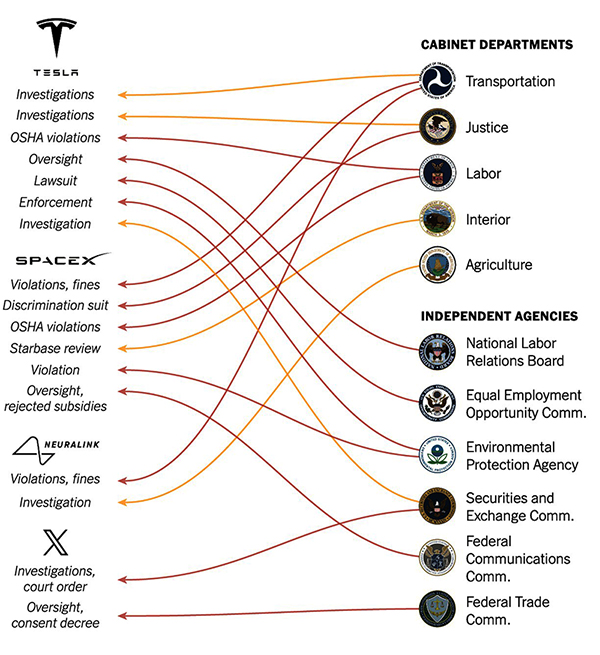

In only 3 weeks as co-president, Elon Musk's long-term goals are becoming increasingly clear. He wants a smaller, weaker government, with many fewer workers, that he and his co-president can easily completely control. This is very different from old-style, 20th-century dictators, who wanted an all-powerful government to enforce their orders. Musk believes that controlling the computers, the data, and the flow of funds is enough in the 21st century. It is a radical theory.
To a large extent, what government does is allow a large number of ordinary (read: individually weak) people to band together to prevent rich (read: powerful) people from running roughshod over them with no constraints. Personally, Musk has a strong interest in having a weak bureaucracy so that when one of his companies is accused of violating the law, which happens rather often, the agency will be too weak and understaffed to do much about it. The New York Times has put together this diagram of the many conflicts Musk has had with government agencies overseeing the more than $15 billion in government contracts his companies have:

Musk understands that revolutions happen when the old order collapses. The U.S. government is not collapsing, so his first order of business is to make it collapse. His tools include decreasing morale by firing long-time employees and making the rest so nervous that they voluntarily seek employment elsewhere (and transferring the holdouts to the Office of Walrus Management in northern Alaska), making all employees show up in the office every day and making the buildings so crappy that no one wants to work there, and so on. For the work that must be done, he wants to replace the workers with AI, even though AI has an extremely spotty record and makes huge mistakes all the time. He doesn't doubt for a second that an AI program could find whole agencies to close because it doesn't know what they are for. Musk has already started having AI look at all the contracts the Department of Education has in order to simply cancel every one not specifically required by some law. Probably he will write a short letter to vendors whose contracts have been canceled reading something like: "ChatGPT has determined that your government contract is not required by law so it is hereby canceled." This will result in thousands of lawsuits and will overwhelm the courts and paralyze them.
But Musk is not leaving everything to automation. He and Russell Vought both believe that the president, and by implication, people working for the president, have the authority to simply refuse to make payments for programs Congress has mandated. However, in fairness, Vought is a stickler for rules and wants to make sure everything he does is technically legal, even if that means digging up some 200-year-old law to justify it. Musk thinks rules and laws are for suckers and fools. His general approach to business parallels Trump's: Just do what you want and then hire good lawyers to endlessly delay or fight all the resulting court cases. For example, at Musk's companies, he told his employees if they join a union, they will lose their stock options. This is illegal, but he knows it will be years before the resulting court cases are resolved and by then the employees will have moved on and given up due to the legal costs.
What Musk seems to be driving at is zero-based government. First destroy the entire thing, one way or another, legally or not. Then create new agencies for those parts of government that he likes. NASA would probably be the first new agency created, since Musk's company SpaceX has $15 billion worth of contracts with it. The Department of Defense might be next and finally a Department of Justice to prosecute Trump's enemies. Health care? Not the government's problem. HUD? Let the cities do that if they want to. Interior? Sell all the national parks and forests to the lumber companies at fire-sale prices.
Pollsters are starting to ask people whether they have a favorable or unfavorable view of Musk. He is already under water and dropping. Here are two recent YouGov polls (for different sponsors):
| Pollster | Dates | Favorable | Unfavorable | Net |
| YouGov | Feb. 2 - Feb. 4 | 43% | 49% | -6% |
| YouGov | Jan. 29 - Feb. 1 | 40% | 47% | -7% |
The polls show that only about 12% of Americans want Musk to have a lot of influence in the administration. Among independents, that is 6-7% (down from 20% in December). In a Quinnipiac U. poll, independent voters disapprove of Musk playing a prominent role in the administration 53% to 39%. These numbers suggest that Democrats should constantly harp on the idea that unelected billionaires should not be running the country. Basically, Musk is a softer target than Trump. Many of Trump's supporters would willingly crawl naked over broken glass for Trump, but few would do it for Musk. If Musk's numbers drop low enough, Trump will see him as a liability and dump him. If that happens, Musk will probably not go gentle into that good night and there could be fireworks. (V)